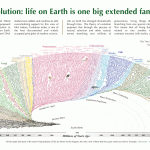Panspermia
"The important point is that since the origin of life belongs in the category of at least once phenomena, time is on its side. However improbable we regard this event, or any of the steps which it involves, given enough time it will almost certainly happen at-least-once. And for life as we know it, with its capacity for growth and reproduction, once may be enough." -George Wald
That there's an amazing story of life's evolution on Earth is a scientific certainty. The evidence is encoded in the nucleic acid sequences of every living organism ever discovered, and the history of life on this…
The Book of Exogenesis: In the beginning was the word, and the word was a meteorite...
Earlier this month, a report, based on NASA studies of meteorites found on Earth, suggested that some building blocks of DNA may have been formed in space.
As it turns out, DNA components have been found on meteorites before, but it's never been entirely clear if the space rocks came to Earth bearing these molecules, or if they were contaminated upon arrival. Furthermore, this recent study of meteorites was the first to discover trace amounts of three molecules -- purine, 2,6-diaminopurine, and 6,8-…
I was thinking about the timeline that brought us here, today, from the origin of the Universe up through the present day. I realized that the most uncertain thing that we know of, the step that we have the least information about, is the origin of life on Earth. All hypotheses about how life on Earth originated fall into three categories:
Abiogenesis, or the idea that life came from non-life, somehow, on Earth.
Life originated elsewhere in the Universe, and was brought to Earth, where it now thrives (e.g., panspermia, or exogenesis).
Life was created or designed by an outside force/being…

